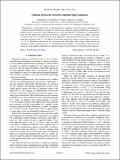| dc.contributor.author | Low, Guang Hao | |
| dc.contributor.author | Yoder, Theodore James | |
| dc.contributor.author | Chuang, Isaac L. | |
| dc.date.accessioned | 2014-08-15T17:44:39Z | |
| dc.date.available | 2014-08-15T17:44:39Z | |
| dc.date.issued | 2014-02 | |
| dc.date.submitted | 2014-01 | |
| dc.identifier.issn | 1050-2947 | |
| dc.identifier.issn | 1094-1622 | |
| dc.identifier.uri | http://hdl.handle.net/1721.1/88731 | |
| dc.description.abstract | Implementing a single-qubit unitary is often hampered by imperfect control. Systematic amplitude errors ε, caused by incorrect duration or strength of a pulse, are an especially common problem. But a sequence of imperfect pulses can provide a better implementation of a desired operation, as compared to a single primitive pulse. We find optimal pulse sequences consisting of L primitive π or 2π rotations that suppress such errors to arbitrary order O(ε[superscript n]) on arbitrary initial states. Optimality is demonstrated by proving an L = O(n) lower bound and saturating it with L = 2n solutions. Closed-form solutions for arbitrary rotation angles are given for n = 1,2,3,4. Perturbative solutions for any n are proven for small angles, while arbitrary angle solutions are obtained by analytic continuation up to n = 12. The derivation proceeds by a novel algebraic and nonrecursive approach, in which finding amplitude error correcting sequences can be reduced to solving polynomial equations. | en_US |
| dc.description.sponsorship | National Science Foundation (U.S.). Center for Ultracold Atoms (1125846) | en_US |
| dc.description.sponsorship | National Science Foundation (U.S.) (RQCC 1111337) | en_US |
| dc.description.sponsorship | National Science Foundation (U.S.) (iQuISE IGERT) | en_US |
| dc.description.sponsorship | United States. Intelligence Advanced Research Projects Activity (QCS ORAQL project) | en_US |
| dc.language.iso | en_US | |
| dc.publisher | American Physical Society | en_US |
| dc.relation.isversionof | http://dx.doi.org/10.1103/PhysRevA.89.022341 | en_US |
| dc.rights | Article is made available in accordance with the publisher's policy and may be subject to US copyright law. Please refer to the publisher's site for terms of use. | en_US |
| dc.source | American Physical Society | en_US |
| dc.title | Optimal arbitrarily accurate composite pulse sequences | en_US |
| dc.type | Article | en_US |
| dc.identifier.citation | Low, Guang Hao, Theodore J. Yoder, and Isaac L. Chuang. “Optimal Arbitrarily Accurate Composite Pulse Sequences.” Phys. Rev. A 89, no. 2 (February 2014). © 2014 American Physical Society | en_US |
| dc.contributor.department | Massachusetts Institute of Technology. Department of Electrical Engineering and Computer Science | en_US |
| dc.contributor.department | Massachusetts Institute of Technology. Department of Physics | en_US |
| dc.contributor.mitauthor | Low, Guang Hao | en_US |
| dc.contributor.mitauthor | Yoder, Theodore James | en_US |
| dc.contributor.mitauthor | Chuang, Isaac L. | en_US |
| dc.relation.journal | Physical Review A | en_US |
| dc.eprint.version | Final published version | en_US |
| dc.type.uri | http://purl.org/eprint/type/JournalArticle | en_US |
| eprint.status | http://purl.org/eprint/status/PeerReviewed | en_US |
| dspace.orderedauthors | Low, Guang Hao; Yoder, Theodore J.; Chuang, Isaac L. | en_US |
| dc.identifier.orcid | https://orcid.org/0000-0001-7296-523X | |
| dc.identifier.orcid | https://orcid.org/0000-0002-6211-982X | |
| dc.identifier.orcid | https://orcid.org/0000-0001-9614-2836 | |
| dspace.mitauthor.error | true | |
| mit.license | PUBLISHER_POLICY | en_US |
| mit.metadata.status | Complete | |
